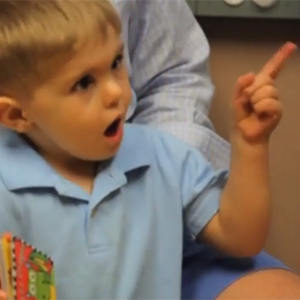
Sign language for babies and toddlers is a new concept in South Africa. Signing has been in practise in the United States, United Kingdom and New Zealand for a number of years and is, for obvious reasons, incredibly popular.
There are crèches and pre-schools who have included it in their curriculum with overwhelming success.
Two American doctors, Drs Linda Acredolo and Susan Goodwyn, conducted a long-term research study, funded by the National Institutes of Health and Human Development. Their eight-year study examined 103 infants, randomly selected (and representative of all groups) to use signing or not. They drew many positive conclusions from their work, some of which are discussed below.
1. It reduces frustration:
Once babies begin to sign, they can begin to tell you what it is that they want or need. Their grunts and points no longer have to be interpreted and a process of elimination followed, the sign will show an exact item or feeling.
2. It increases self esteem:
Signing infants can become a part of the conversation, they can “tell” you something and you will actively “listen”. They get constant recognition and immediate feedback.
3. It enhances language and listening skills:
Babies who were exposed to signing tended to talk earlier and to build a vocabulary quicker than their non-signing counterparts. Words which were a combination of sounds before, now take on a more tangible meaning. Once they can say the word(s) they tend to drop the sign (which is quite sad when they all go!).
4. It enriches relationships:
As the interaction between the child and the parent/caregiver is more active and understood, there is a definite element of trust, empathy and understanding. Each party feels more valued and the number of negative/frustrating interactions are lessened.
5. It provides a window into your child's world:
Once your baby starts signing, you are told what they can see, hear, remember, think or feel. Their understanding and associations are enlightening.
6. It increases their IQ:
Acredolo and Goodwyn tested the original participants' IQ when they were eight. Children who had signed as babies scored, on average, 12 points higher than the children in the non-signing control groups.
7. It facilitates bilingual learners:
Using the same sign for two words enables the child to recognise them as the same thing. Although the words may sound very different, e.g. "bird" and "voël", the simple sign remains consistent.
Baby signing is an ongoing process which, when started, develops continuously at the rate that you and your baby dictate. All people involved in the care and upbringing of your child (including older siblings) are encouraged to learn the basics.
Babies are only physically able to perform the signs at around seven to eight months. This does not mean that workshops are limited to this age group. On the contrary, children who are younger are more likely to start responding at a younger age and children who are 10 months or older will start signing almost immediately as they will already have the hand-eye co-ordination in place which is necessary to duplicate the signs. Signing can be introduced and used until your child is a confident and fluent communicator. - Kim Foster (author of the book For Before Words)




 Publications
Publications
 Partners
Partners











